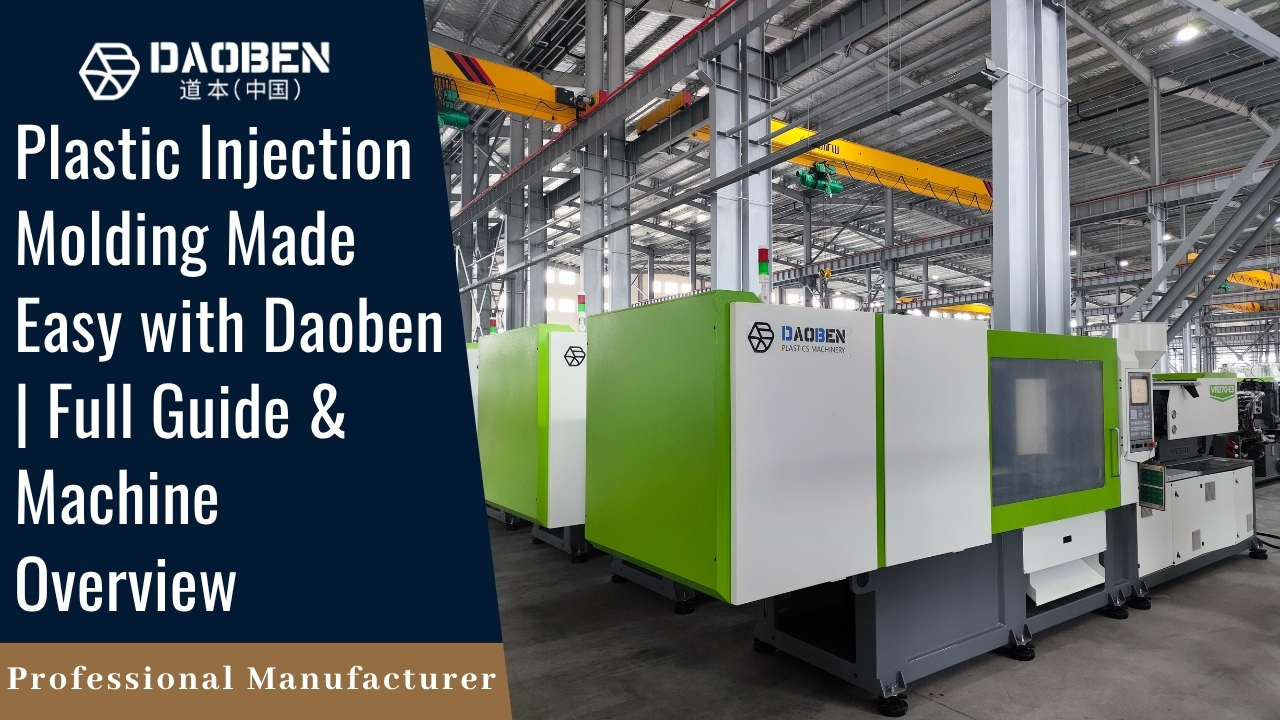The injection molding industry powers modern plastics—cars, medical devices, packaging, and everyday goods. As volumes rise and cycles shrink, Daoben Machinery keeps you ahead. Our 30–4000-ton presses deliver speed, precision, and energy-saving tech, giving manufacturers the flexibility and scale to meet today’s demand—sustainably.
State of the Injection Molding Industry
Market Size & Growth Trajectory
- The global injection molding machine market was valued around USD 16,606.3 million in 2024 and is forecast to reach USD 25,491.5 million by 2033, with a CAGR of about 4.9%.
- More broadly, the plastic injection molding market is expanding in volume and value—driven by sectors such as packaging, automotive, electronics, and medical devices.
- Regional growth is especially strong in Asia-Pacific, which holds the largest share in machinery demand and plastic part production.
Key Sectors Fueling Demand
- Packaging & Consumer Goods: E‑commerce and fast-moving consumer goods push demand for molded plastic components and containers.
- Automotive & Mobility: Lightweight, complex plastic parts for EVs, interiors, structural components continue driving demand.
- Medical & Healthcare: Strict tolerances and biocompatible materials put pressure on machine precision and process control.

Table of Contents
ToggleTrends Reshaping the Industry
1. Smart Manufacturing & Industry 4.0 Integration
The adoption of IoT, sensor networks, and AI-driven control systems is enabling real-time monitoring, predictive maintenance, adaptive process control, and improved throughput. Machines are becoming more “aware” and responsive to deviations.
2. Sustainability, Circular Economy & Material Innovation
Increasing regulatory and consumer pressure is pushing manufacturers to use recycled plastics, biodegradable polymers, or reprocessed “regrind” materials. The challenge is maintaining performance, appearance, and material consistency.
3. Advanced Mold & Cooling Techniques
Technologies like conformal cooling, rapid heating/cooling molds, and multi-material / multi-color molds help reduce cycle times, improve surface quality and allow more intricate component designs.
4. Hybrid & All-Electric Machines Gaining Ground
To reduce energy consumption and increase control precision, more manufacturers are turning to electric or hybrid injection molding machines. These machines offer faster response times, quieter operations, and better efficiency, especially in mid to high-volume production.
5. Demand for Larger & More Robust Machines
As demand for bigger parts—bulk containers, structural parts, appliance housings—grows, the need for high-tonnage machines (2000 Ton +) is also rising.
Challenges in the Injection Molding Industry
High CapEx & Maintenance Costs
Investment in high-tonnage, precision machines and their maintenance (parts, calibration, downtime) is substantial. This is especially challenging for small-to-medium manufacturers.
Material Variability & Quality Control
Using recycled or mixed lots of plastic can introduce variability. Maintaining consistency, avoiding defects (warpage, sink marks, voids), and controlling process windows becomes tougher.
Energy & Resource Efficiency
Machines often run continuously. Energy consumption, cooling water usage, and waste generation are key cost and environmental considerations.
Skilled Workforce & Digital Transformation
Advanced machines require operators skilled in sensors, data analytics, and control systems. Bridging the talent gap is a barrier for many companies.
Fast Cycle Expectations & Market Pressure
Customers demand shorter lead times and faster turnaround. Balancing speed with precision and reliability is a constant pressure.

How Daoben Machinery Supports the Modern Injection Molding Industry
At Daoben Machinery, we understand these industry dynamics, and our machine offerings and services are engineered to meet them head-on.
Wide Tonnage Range (30 Ton to 4000 Ton)
- 30–200 Ton machines allow you to produce small, precise components (electronics, medical parts).
- 200–1000 Ton range suits consumer goods, packaging, and automotive intermediate parts.
- 1000–4000 Ton machines address large parts like containers, appliance shells, industrial housings, and structural components.
This flexibility gives you room to scale your production as your business grows, without having to change equipment suppliers.
High Efficiency & Smart Control Features
- Integration of servo-electric systems or hybrid drives helps reduce power consumption and improve control precision.
- Our machines come embedded with sensors and interfaces ready for IoT / Industry 4.0 integration.
- Adaptive process control and data feedback help maintain stable cycles and reduce scrap.
Support for Advanced Mold Technologies
- We design machines to accommodate molds with conformal cooling, multi-cavity designs, and more complex gating systems.
- Strong capacity for customization ensures your mold design constraints are met.
Focus on After-Sales Service & Long-Term Partnerships
- Spare parts availability and responsive service minimize downtime.
- Training and technical support help your operators fully leverage the machine capabilities.
- We partner with you through upgrades and expansions.
Outlook & Opportunities for Players in the Industry
Lean Toward Green Manufacturing
Stay ahead by developing machine and process solutions compatible with recycled resins, bioplastics, and lower-waste cycles. Buyers will increasingly favor eco‑friendly suppliers.
Move Up the Value Chain
Integrate simulation, digital twin, AI optimization, and real-time control as differentiators. If your machine platforms can offer “smart” features, you stand out.
Target Niche & High‑Complexity Parts
Focus on customers needing precision, multi-material, or large structural parts—areas where commodity molding can’t compete. Your machine flexibility becomes a selling point.
Service & Retrofit as Revenue Streams
Offering retrofits, upgrades, preventive maintenance, and data services can extend revenue and customer lock-in.
Localized Manufacturing & Reshoring Trends
Some global manufacturers are moving production closer to end markets to reduce logistics, tariffs, and supply chain risk. This opens opportunities for regional machine suppliers.
Summary
The injection molding industry is dynamic, competitive, and rapidly evolving. Market size is increasing, technology is advancing, and demands for sustainability and speed are higher than ever. As a leading manufacturer of injection molding machines from 30 Ton to 4000 Ton, Daoben Machinery is uniquely positioned to deliver solutions that help customers adapt, scale, and compete.
Whether you’re molding tiny medical components or large industrial containers, working with us means access to machines built for modern challenges—smart, efficient, and supported for the long term.



